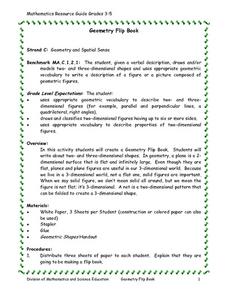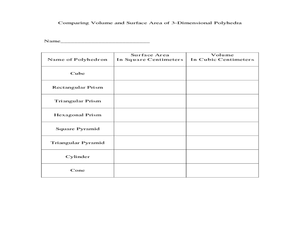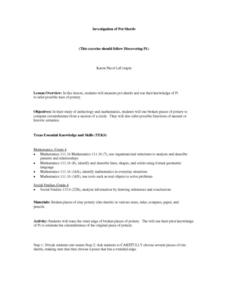Curated OER
Water and Ice
Students explore what happens to water as it goes from solid to liquid and back. In this state of matter lesson, students observe, measure, and describe water as it changes state.
Granite School District
Kindergarten CCSS Math Vocabulary Word List
Help kindergartners develop the academic language they need to master the Common Core standards with this list of math vocabulary. Including the definitions of each term as well as a set of word cards with supporting images and examples,...
Shodor Education Foundation
Pythagorean Theorem
Most adults remember learning about the Pythagorean theorem, but they don't all remember how to use it. The emphasis here is on developing an intuitive understanding of how and when to use the theorem. Young mathematicians explore...
Curated OER
Recycle Milk and Juice Cartons
For this recognizing the importance of recycling worksheet, students complete a cryptograph, read facts about milk and juice cartons, and read about making crafts from trash. Students write 10 answers.
Curated OER
Pythagorean Theorem
In this measurement lesson, learners examine the Pythagorean Theorem, perimeter, and areas of right triangles. They record their measurements and research their findings on a grid.
Curated OER
Polydron Fun
Students investigate nets as they relate to volume and area. In this geometry lesson, students use nets as a visual to deepen their understanding of surface area and volume of objects. They make conjectures about different objects and...
Curated OER
Comparing Covalent and Ionic Substances
In this covalent and ionic substances worksheet, students use the internet to find information about the characteristics of covalent and ionic substance and explain what causes the differences in these types of substances.
Curated OER
Stirring up Fractions
Second graders practice unit fractions to identify parts of the whole and parts of a set. They utilize a variety of manipulative's including recipe boxes to get them started stirring up fractions. A multitude of books on fractions are...
Curated OER
Polyominoes
In this dominoes worksheet, students solve a word problem involving different ways to put dominoes together. Students complete 1 complicated higher order thinking problem.
Curated OER
Geometry Flip Book
Students investigate the concepts of geometry that can be grouped into a flip book that can be used for teaching and review purposes. They define the differences between two and three dimensional figures. Also polygons are reviewed and...
Curated OER
Investigating Nets and Polyhedra
Fifth graders create a net for a given polyhedron. They determine the corresponding polyhedron for a given net. Students investigate several polyhedra (cube, tetrahedron, and one of their choosing) and their corresponding nets. They...
Curated OER
Pythagorean Theorem
Students investigate the Pythagorean Theorem. In this seventh through twelfth grade geometery lesson plan, students explore the Pythagorean Theorem and its converse and use it to find the length of the missing side of a right triangle.
Curated OER
Volume and Surface Area
Students explore volume and surface area. In this math instructional activity, students fill boxes with cubes to identify the volume of the boxes. Students discuss area.
Curated OER
The Value of Volume
Students measure the perimeter and area of their polygons. In this geometry instructional activity, students calculate the volume and area using the correct tools. They calculate the time and temperature and the perimeter and side...
Curated OER
Exploring Characteristics Needed to Prove Two Trianlges Congruent
Tenth graders explore congruent triangles. In this geometry lesson, 10th graders investigate the conditions necessary to prove two triangles congruent. The lesson combines dry erase board activities and the use of technology.
Curated OER
Chemistry Module
High schoolers build metal atomic models using styrofoam. For this chemistry lesson, students identify the different unique properties of metals. They explain how metal atoms bond.
Curated OER
Angle Exploration and Classification
Students compare and contrast angles and identify them as acute, obtuse, right, or straight angles. They create rays and angles using uncooked spaghetti, read and discuss key vocabulary terms, and complete a variety of geometry worksheets.
Pennsylvania Department of Education
Volume of Regular and Irregular Objects
Fifth graders examine patterns and relate to equations to solve math problems. In this patterns lesson, 5th graders diagram, graph, use models and use tables to solve equations for real world problems.
Curated OER
Geometry and Tony Smith Sculpture
Students respond to Tony Smith's sculpture as art and brainstorm about math concepts inherent in his work. They create a sculpture with polyhedra nets, calculate the cost of covering sculpture in gold, and write an exhibit label for...
Curated OER
Tower O'Power
Students work together to design a tower from a computer program. They manufacture the pieces with a laser cutter and compete in a competition to determine the best design for stress relief on towers. They discover the work engineers...
Curated OER
Investigation of Pot Sherds
Fourth graders review their prior knowledge on the concept of pi. Using broken pieces of pottery, they calculate the circumference from a section of the circle. In teams, they compete against one another to get the most accurate...
Curated OER
Play Dough Day
Twelfth graders build a model of the following figures with the base from column I and the cross-section from column II. Draw the base with labeled axes on the graph paper and construct the figure on top of the base with the play dough...
Curated OER
Faces, Vertices, Edges
Students identify the parts of three dimensional objects. In this geometry lesson, students find the number of faces, edges and vertices. They differentiate between prisms and polyhedra.
Curated OER
Area of Complex Figures
Fifth graders use formulas for calculating areas of squares and rectangles to find area of complex figure, compare their own ideas with their classmates' ideas, and recognize that there are multiple methods for finding area of complex...

























